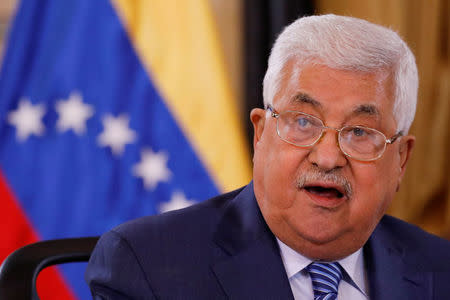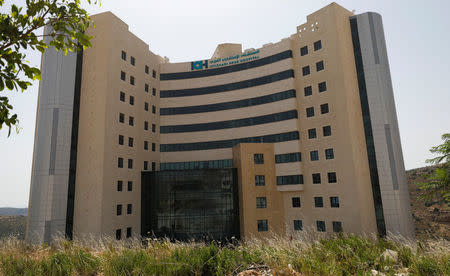Palestinian President hospitalised, condition 'reassuring' says doctor
By Ali Sawafta
RAMALLAH (Reuters) - Palestinian President Mahmoud Abbas was hospitalised in the West Bank on Sunday, doctors and Palestinian officials said, giving conflicting accounts of the leader’s condition.
It is the third time Abbas, 82, has been hospitalized in less than a week. He is expected to stay at least overnight.
Abbas underwent minor ear surgery on Tuesday but went back into al-Istishari Hospital in Ramallah briefly overnight on Saturday/Sunday, the official Palestinian news agency Wafa said.
He was then rushed back later on Sunday, for what doctors described only as "medical tests".
Dr. Saed al-Sarahneh, medical director of the hospital, spoke outside the private hospital late Sunday, saying that Abbas had entered in the morning "for medical tests after the surgery he had three days ago in his middle ear. All the tests are normal and his medical condition is reassuring."
The Palestine Liberation Organization (PLO), which is headed by Abbas, said on its Twitter account that Palestinian chief negotiator Saeb Erekat had visited the leader in hospital and quoted Erekat as saying: "the President is in good health".
An aide to Erekat said that Abbas had talked and joked with him, and that Abbas was expected to leave hospital tomorrow or the day after.
One Palestinian official in Ramallah said Abbas had gone back in because of complications after Tuesday’s ear surgery. Abbas had been running a high temperature, he said, "so doctors advised that he go back into hospital".
However, a source at al-Istishari hospital said the president's condition was unrelated to the ear operation.
"The president will stay in hospital until tomorrow. He is being given antibiotics to treat an inflammation in the chest," said the hospital source, who spoke on condition of anonymity because he or she was not authorised to speak with the media.
Abbas, a heavy smoker, was hospitalised in the United States for medical checks in February during a trip to address the U.N. Security Council.
The Western-backed leader became Palestinian president after the death in 2004 of his predecessor, Yasser Arafat. He pursued U.S.-led peace talks with Israel but the negotiations broke down in 2014.
He is also chairman of the executive committee of the PLO, a position to which he was re-elected unopposed on May 4.
Abbas' hospitalisation has coincided with an escalation in Israeli-Palestinian tensions after Israeli troops shot dead dozens of Palestinian protesters on the Gaza border on May 14 as the new U.S. Embassy opened in Jerusalem.
The Gaza Strip is controlled by the Islamist group Hamas, a bitter political rival of Abbas's secular Fatah movement.
(Reporting by Ali Sawafta and Nidal al-Mughrabi; Writing by Maayan Lubell; Editing by Stephen Farrell, Dale Hudson, William Maclean)



